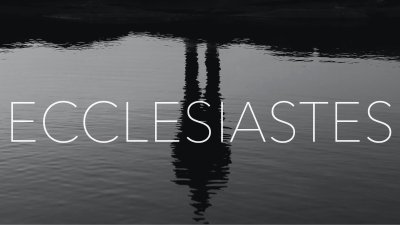


Ecclesiastes
Finding Meaning
Finding Purpose
Ecclesiastes 1:12–18, Ecclesiastes 12:13–14
For further reflection: 1. Throughout Ecclesiastes, we are taken along the Preacher's journey as he explores the concept of purpose. In his exploration, the Preacher wrestles with two different viewpoints, each view leading to a different conclusion for the purpose of life. Within the secular view, one believes that there is no God and that this life is all there is. Within the view of faith, one believes in the existence of God and the reality of life after death. Look through the lens of each view. What conclusion does each view lead you to in defining the purpose of life? 2. How do you think each view affects the way we experience life? 3. Think about your day-to-day actions and mentality. Are they guided by an overall purpose in life? If so, what is that purpose?
Finding Meaning
Ecclesiastes 1:2–5, Ecclesiastes 1:9–11, Ecclesiastes 2:18–20, Ecclesiastes 3:1, Ecclesiastes 3:9–15
For further reflection: 1. Read Ecclesiastes 1:10: “Is there anything of which one might say, ‘See this, it is new’? Already it has existed for ages Which were before us.” Within the secular view, the Preacher is saying that every generation’s attempt at creating meaning is really just all the same empty pursuit. Give a few practical examples of this. 2. Read Ecclesiastes 3:14: “I know that everything God does will remain forever; there is nothing to add to it and there is nothing to take from it, for God has so worked that men should fear Him.” Summarize in your own words what this verse is saying about God’s work. 3. Do you tend to feel a) disillusioned and unmotivated or b) stressed and under a lot of pressure? How does the reality that God is using your life as part of his eternal plan of redemption affect those feelings?
Finding Satisfaction
Ecclesiastes 2:9–11, Ecclesiastes 2:24–25, Ecclesiastes 5:10–11, Ecclesiastes 5:19–20, Ecclesiastes 9:7–10
For further reflection: 1. Reach Ecclesiastes 5:11: “When good things increase, those who consume them increase.” Come up with a few practical examples that demonstrate the principle communicated in this verse. 2. Read Ecclesiastes 2:24-25: “24 There is nothing better for a man than to eat and drink and tell himself that his labor is good. This also I have seen that it is from the hand of God. 25 For who can eat and who can have enjoyment without Him?" Summarize verse 24 in your own words. Do the same with verse 25. What is the basic message that these two verses are communicating? 3. What in your life do you need to reframe as a gift from God instead of looking to it for satisfaction?
Finding Motivation
Ecclesiastes 12:12–14, Ecclesiastes 7:2, Ecclesiastes 11:1–2, Ecclesiastes 11:9–10, Ecclesiastes 12:6–7
For further reflection: 1. Read Ecclesiastes 11:1: “Cast your bread on the surface of the waters, for you will find it after many days.” The preacher is painting a picture of a businessman who puts commercial goods on a ship to be sold. In this time period, he would have had to wait a very long time before the ship completed its journey and he saw his profit back. Why do you think the Preacher use this picture to describe a life committed to God? 2. Read Ecclesiastes 12:13: “The conclusion, when all has been heard, is: fear God and keep His commandments, because this applies to every person.” The Preacher asserts that a life of faith is a life of joy. How do the two callings in this verse each lead us to experience joy? 3. Reflect on 3 areas in your life in which you can practice faithfulness. Remember, faithfulness is anything that flows out of trust in and dependence on God.



